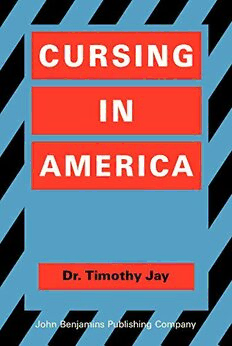
Cursing in America: A psycholinguistic study of dirty language in the courts, in the movies, in the schoolyards and on the streets PDF
Preview Cursing in America: A psycholinguistic study of dirty language in the courts, in the movies, in the schoolyards and on the streets
CURSING IN AMERICA CURSING IN AMERICA A psycholinguistic study of dirty language in the courts, in the movies, in the schoolyards and on the streets by TIMOTHY JAY North Adams State College JOHN BENJAMINS PUBLISHING COMPANY PHILADELPHIA/AMSTERDAM 1992 TM The paper used in this publication meets the minimum requirements of 8 the American National Standard for Information Sciences – Permanence of Paper for Printed Library Materials, ansi z39.48-1984. Library of Congress Cataloging-in-Publication Data Jay, Timothy. Cursing in America : A psycholinguistic study of dirty language in the courts, in the movies, in the schoolyards and on the streets / by Timothy Jay. p. cm. Includes bibliographical references and index. 1. English language--Obscene words--Psychological aspects--United States. 2. Blessing and cursing--Psychological aspects--United States. 3. Words, Obscene-- Psychological aspects--United States. 4. English language--United States--Obscene words. 5. Americanisms. I. Title. PE3724.03J38 1992 401’.9’0973--dc20 92-6300 isbn 978 90 272 2092 9 (EUR) / 978 1 55619 451 1 (Us) (Hb ; alk. paper) isbn 978 90 272 2093 6 (EUR) / 978 1 55619 452 8 (Us) (Pb ; alk. paper) isbn 978 90 272 7405 2 (Eb) © 1992 – John Benjamins B.V. No part of this book may be reproduced in any form, by print, photoprint, microfilm, or any other means, without written permission from the publisher. John Benjamins Publishing Co. · P.O. Box 36224 · 1020 me Amsterdam · The Netherlands John Benjamins North America · P.O. Box 27519 · Philadelphia pa 19118-0519 · usa Acknowledgments First, thanks to my teachers: Joseph Danks and James Dooling at Kent State University; Gordon Allen and Arthur Miller at Miami University; and Zoltan Kovecses, who was on a Fulbright at the University of Massachusetts when I met him. Next, thanks to my colleagues who have supported my work: James May, Harris Elder, Paul Tero, Reinhold Aman, Douglas Herrmann, Robert Treichler, William Brigman, Paul LeSage, and Therese Bruck. For their interest in exposing my research to the public, many thanks to my friends in various media and entertainment industries: comedian George Carlin, writer Jean Callahan, Nathan Cobb from the Boston Globe, Phil Tuckett of NFL Films, Cable Neuhaus formerly with People Magazine, Richard Gilbert of NBC Television, Beth Engeler of WAMC Radio, Chip Rowe from Playboy magazine, Greg Ptacek, Entertainment Tonight, Parenting magazine, New Woman magazine, The Sydney Times, TV Guide, USA Today, Wall Street Journal, Cable Choice magazine, and American Health magazine. Thanks to Robert Broom and Mary Clarkson, attorneys at law. Thanks to the staff at North Adams State College who have helped in the production of this work: Ray Gaudette, Leon Peters, John Truskowski, Paul Humora and Alan Yagmin. Thanks to the members of the administration who funded my research and travel ventures. Thanks to my research assistants, who for many years have helped in the collection of the data herein. A special thanks to Alan Claffie who did most of the final word processing chores. Finally, thanks to the members of my family, especially Jessica, who have been most patient and supportive for many years. Table of Contents Chapter 1 What are "Dirty" Words? 1 Chapter 2 When Children Use Dirty Words 17 Chapter 3 Anger and Dirty Words 73 Chapter 4 The Frequency of Dirty Word Usage 111 Chapter 5 The Offensivenes s of Words: Sex and Semantics 159 Chapter 6 Free Speech and Censorship 195 Chapter 7 Unfinished Business and Future Research with Dirty Words 235 Chapter 8 Bibliography 245 Index 273 Detailed Table of Contents Chapter 1 - What are "Dirty" Words? 1 Cursing Profanity Blasphemy Taboo Obscenity Vulgarity Slang Epithets Insults and Slurs Scatology What is the Value of Classification? Connotative and Denotative Use Colorful Metaphors Context is Critical Time Perspective Summary Chapter 2 - When Children Use Dirty Words 17 Language Development The Language of Infancy (Birth to Two Years) Anger and Dirty Words in Infancy The Origins of Humor Pre School Humor Final Thoughts About Infants The Language of Childhood (Two to Eleven Years) Childhood Humor Elementary School Humor Childhood Name Calling and Insulting Object Naming Childhood Story Telling From Childhood to Adolescence: Final Thoughts Two General Issues of Sex Talk and Language at School The "Etiquette" of Dirty Words and Sex Talk Conclusions About Sex Talk The Issue of Dirty Language at School The Emergence of an Obscene Lexicon Field Study One Field Study Two: Summer Camp Summary of Field Studies Conclusion Chapter 3 - Anger and Dirty Words 73 Anger Expressed Through Cursing or Blasphemy Anger Expressed Through Reference to Subnormal Thought Anger Expressed Through Reference to Obscenity Anger Expressed Through Reference to a Sex Organ Anger Expressed Through Reference to a Deviant Sex Act Anger Expressed Through Reference to Being Sexually Violated Anger Expressed Through Reference to Social-Sexual Deviation Anger Expressed Through Racial Ethnic Reference Anger Expressed Through Scatology Anger Expressed Through References to Body Product or Process Anger Expressed Through Items Associated With Body Products Anger Expressed Through References to Animal Feces Anger Expressed Through References to Animals The Context of Anger Expression Social-Physical Setting Speaker-Listener Variable Discussion The Etiquette of Anger Expression The Five Stage Model of Anger Stage 1: The Offending Event Stage 2: The Degree of Anger Stage 3: Attempts to Control Anger Stage 4: Loss of Control Stage 5: Retribution The Value of Expressing Anger Summary
